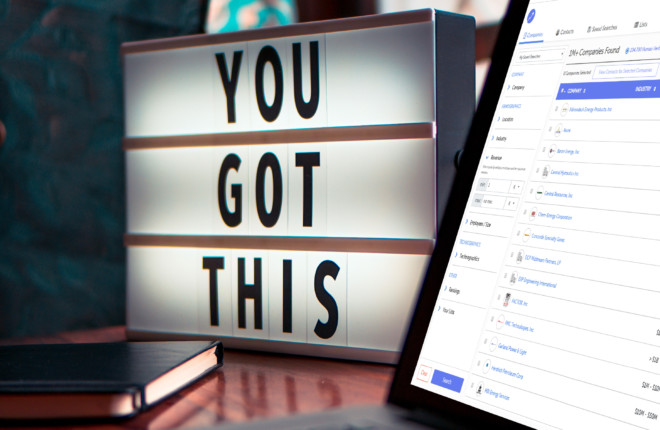It feels like an event apocalypse, us here at SalesIntel included.
As the US remains gripped by a health scare over the last few weeks, one of the earliest casualties has been business events. Almost every event of scale scheduled for the next couple of months has been canceled.
We were supposed to attend three major events in the coming months- Adobe Summit, REV2020, and Unleash 2020 and to be honest when learned about them being canceled, it was quite a setback. One, because we had been preparing for it for months and second, it meant losing a major component of our lead gen engine.
With our marketing schedule up in the air, we sat down with our team to develop alternate strategies and as disastrous as it initially seemed, we soon began to realize that there might be a silver lining to all of this.
After all, everyone (including our competitors) is affected by the health concerns surrounding the Coronavirus but if we somehow manage to find value despite these cancellations, we’ll still come out on top.
Events are important because they are arguably the most effective channel of customer engagement. Every person at an event has spent a fair amount of time and money to be there and for that reason is more receptive to new ideas and solutions.
With countless presentations, case studies, keynotes, demos, and other materials, it’s a place where they can get a wealth of information and resources and the fact that it’s all face-to-face makes the experience more engaging and credible.
Now, human interaction is surely a key component of events but that doesn’t mean the rest of a typical event environment can’t be replicated in another way. It might not be as effective but any viable alternative is infinitely better than nothing.
At a time when the current streak of event cancellations has punctured the lead gen and customer engagement strategies of most companies, here we discuss some surefire ways to fill the gap.
Before we go there, it’s important that you take care of these two basics first:
1. Retain Your Slot
First things first- as you learn about your event cancellations, don’t just turn around and shoot a cancellation email to all the prospects with whom you had scheduled a meeting. Instead, reach out with an alternative that goes along the line of – The event is canceled, our meeting is not!
The fact that your prospects have booked a meeting indicates strong buying intent. Canceling the meeting would be a loss for both. So draw up a new plan (which we will discuss in a moment) that coincides with your previous schedule and instead of a cancellation notice, send them a new virtual invite and updates.
2. Recalibrate & Reequip
The core purpose of events is to engage customers and generate qualified leads that require the combined efforts of both sales and marketing teams.
Now that the events are canceled, the same team can shift their focus to alternative strategies and use slightly tweaked tools to achieve essentially the same goal. Cancellations do not have to result in empty calendars and abandoned projects.
For example, your efforts and investments towards creating an appealing event booth to attract prospects can be repurposed towards acquiring a good data provider that would enable you to reach more prospects effectively.
The time your sales team would have spent at the event can be reallocated for personalized outreach. The cards and brochures you would have printed can be converted into slides or even direct mail collateral.
The point is, the goal hasn’t changed, the prospects haven’t changed, the only thing that’s changed is the channel and strategy.
So you need to recalibrate your existing tools and reequip your sales reps with alternate resources to make the most out of your new reality.
Now that you have locked in your interested prospects and have a refreshed mindset, here should be your next plan of action:
3. Go Virtual
Though nothing beats a good old face-to-face meeting and a firm handshake, virtual events are nonetheless the future and it’s a great opportunity to experiment as the attendance rates are bound to be higher than usual given prospects have simply nowhere to go.
If you look around, many large events like those of Google and Adobe have only canceled their onsite events and have moved a major portion of their agenda to online streaming.
While the downsides of online events like webinars and virtual conferences are an open secret – lower engagement, poor leads, etc, there are markedly numerous upsides as well.
Not only are they operationally more efficient but can also cater to larger audiences and can bypass geographical constraints. You would obviously need to run aggressive outreach campaigns to create buzz and gain maximum traction but if you have the right b2b data to back those campaigns, it shouldn’t be much of a problem. So yes, the audience might be less engaged but it would be more than compensated through sheer scale.
4. Host Your Own Mini-event
You aren’t the only one affected. Get in touch with other companies whose products and services align with your own (maybe even try and get a few sponsors) and collaborate to build your own mini-event with virtual panel discussions, Q&As, presentations, and more.
While currently out of necessity, it may as well turn out to be a viable strategy and serve as a template for the future. You should already know your fellow cosponsors for the canceled event.
So reach out to ones you have synergies with and see what initiatives you can partner with them on.
Besides engaging your customers and in the process generating leads, it has two other notable benefits. First, it allows you the flexibility to deviate from the theme of the original event and have it more centered around your message. Second, even if you start small this year, it will open up new viable channels that you can nurture and grow later.
5. Retain the Offline Touch
Event cancellations also mean that you will save a significant portion of your marketing budget but don’t treat it as just “savings”. Use the money to strategically reallocate it towards other initiatives.
It might be hosting a lunch & learn for a local company or sending direct mail personalized goodies for those signing up for your virtual event. This enables you to get the best of both worlds- efficiency and scale of virtual space as well the engagement and credibility of a personalized touch.
6. Repurpose & Distribute the Event Materials
You must be preparing for events for months – meaning you might have a lot of promotional material already made that you planned to hand out. With events canceled, they don’t have to go to waste.
There are still plenty of ways to repurpose and meticulously use each of those pieces to have a maximum impact. For instance, the canceled event might still be accepting guest posts or its social group would be a ripe target to reach out to prospects who are looking for new events to attend.
Use these channels to your advantage with your repurposed content to engage customers even before the event kicks off.
Everything said, these are bad times for businesses who rely extensively on event marketing but it doesn’t have to. If only you can be flexible in your strategy and swift in action, much of the current troubles can be turned into opportunities.
If you want the data to quickly transition to your virtual strategy, we are here to help.




